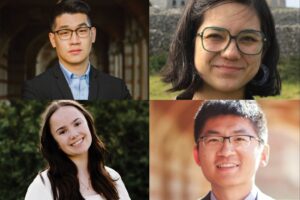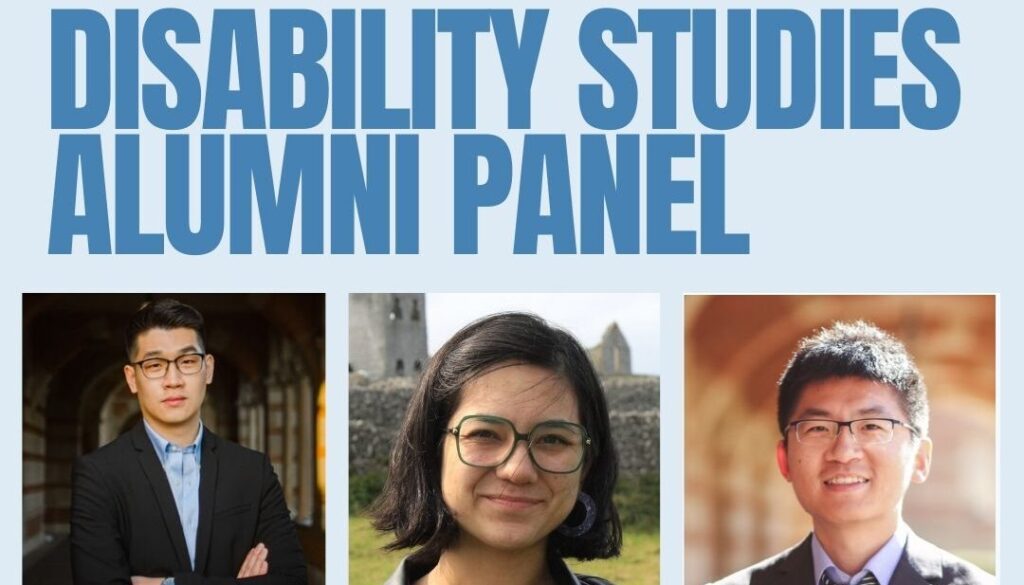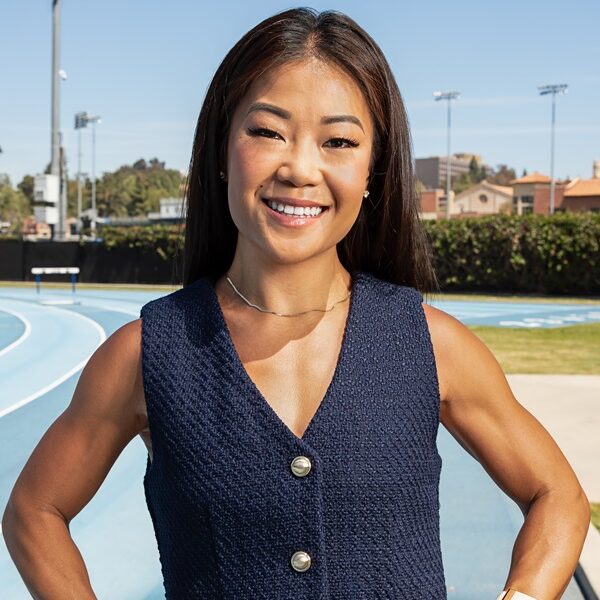By: Kayla McCormack
View the original article on UCLA Newsroom.

From clinical psychology to arts and entertainment, education and beyond, disability studies is a field that touches nearly every career path. On April 9 at 6 p.m., three UCLA alumni will share how they’ve applied their disability studies education to their careers in a virtual, student-led panel, followed by a Q&A session.
Josh Yen-Ho Chou, Quinn O’Connor and Zhe Zhang will discuss how they are advancing accessibility, representation and equity across arts, education and academic research. These Bruins are using their education to challenge societal norms and create inclusive spaces. After the discussion, attendees will have the chance to ask questions.
The panel, moderated by event organizer and current disability studies student Annemarie Lawrence, offers a unique opportunity to engage with alumni who are pushing boundaries and making an impact. Get a preview of their insights below.
Annemarie Lawrence
Lawrence is a fourth-year molecular, cell and developmental biology and disability studies double major.
What does it mean to you personally to have helped organize this panel?
Organizing this panel has been a very meaningful experience, and I am so grateful I had the opportunity to bring this group of people together. I am very excited to see UCLA alumni and current UCLA students talk about their experiences with disability studies and connect over what it means to them to be part of this program and participate in this kind of work. It has been great connecting with alumni and see how much they care about getting to know current students and help guide them towards what they want to do — and provide their own personal insights into this new and evolving field.
Why is disability studies such an important and impactful field?
I pursued disability studies because I was raised by parents who are Deaf and identify as disabled. I was eager to get a greater understanding about how we needed to rewrite the narratives surrounding disability and what is considered “normal” by understanding the lived experiences and perspectives of people with disabilities. Disability studies gives a platform for individuals with disabilities to talk about their experiences in a world that has historically marginalized their identity, as well as their abilities; provide opportunities for students to recognize how our world is programmed to exclude individuals with disabilities; and transform spaces into ones where the voices of individuals with disabilities are not only heard, but deeply valued.
What advice do you have for other current UCLA students who want to get involved with disability studies?
Personally, exploring disability studies and getting involved with the program was the best decision I have made during my time at UCLA. The professors, faculty and administrative staff are nothing less than amazing and are so dedicated to making sure each and every student in the program succeeds. For those interested in exploring disability studies, reach out to our student advisor, Lonnell Edwards, who is extremely knowledgeable in our program and goes above and beyond to support students; I’d also encourage taking classes such as Disability Studies 101W.
Quinn O’Connor ’22
O’Connor, who graduated with a bachelor’s degree in theater and a minor in disability studies, is a theatrical producer based in Los Angeles.
How has your interest in disability studies informed and shaped your career path?
My interest in disability studies has provided me with an ethos to frame my long-term goals around. As a disabled person working in the arts industry, I have come across many points of inaccessibility in my own work and the surrounding environment. Disability studies allowed me a space to investigate the intersection of arts and disability through internship and thesis opportunities. My thesis — assessing the accessibility measures at various theatrical institutions across the country — launched my career and allowed me to start conversations surrounding access at many theaters in Los Angeles and beyond.
What’s an example of an impact you hope to make in your particular field?
Long term, I want to build accessibility into a nonprofit theatrical budget in a way where the organization implements it in a sustainable way. Right now, if an arts organization has access measures budgeted, it tends to be the legal minimum required by the Americans with Disabilities Act. I seek to influence and guide these organizations to think of access through a framework of disability studies and cultivate environments that are truly accessible and welcoming to the disabled community — including audiences, artists and staff.
What advice would you give current UCLA students looking to apply those principles within their careers?
1. Get immersed into the community you wish to serve and have these experiences inform your work. Disability is very nuanced and specific to the individual, so including a variety of perspectives in your work is vital. 2. Don’t be afraid to ask questions and go beyond the prescribed boundaries! I would not be where I am today if it weren’t for the cold calls to professionals, advocacy within UCLA and outside, and asking my professors how I could fit my interests into my studies. With disability studies being a relatively new field, every emerging graduate from the program has the responsibility to forge their career path with this framework integrated in the work. Disabled people have been sidelined in fields ranging from the arts to medicine to education — and now is the time we can make our fields accessible to all.
Zhe Zhang ’18
Zhang, who graduated from UCLA with a degree in statistics, is a Ph.D. candidate in the Special Education: Deaf and Hard of Hearing program at Teachers College, Columbia University.
How has your interest in disability studies informed and shaped your career path?
Disability studies has revealed the limitless potential within every individual, teaching me that we are not confined by notions of normalcy. It has empowered me to reshape and revalue my perspectives on society and myself. This transformative perspective has driven me to transition from a data analyst to a special education teacher, and now I am pursuing my Ph.D. in special education. My goal is to make society more accessible and inclusive, ensuring that people from diverse backgrounds and with different needs can thrive in a more accepting environment.
What’s an example of an impact you hope to make in your particular field?
One of the most profound lessons I learned in the disability studies program was the redefinition of “disabilities.” This realization inspired me to believe that there are no disabled students, only “disabled education.” My hope is to create an education system that is more inclusive, accessible and thoughtful about the challenges faced by different individuals. By doing so, we can ensure that our education does not disable anyone. This belief motivates me to advance in the field of special education, both in research and practice, aiming to remove barriers and create opportunities for all students.
What advice would you give current UCLA students looking to apply those principles within their careers?
From loss to gain: This is a lesson I learned from a Deaf culture class. Losses can be challenging, but they often contain hidden strengths and opportunities. Do not set any boundaries for yourself. Our lives are full of infinite possibilities. Each of us is unique and special. Don’t worry about what you can’t do; we all have unique strengths that can make the world a better place. Embrace yourself fully — both your strengths and weaknesses. By gaining perspectives on our losses, we can discover immense strength and potential within them.
Anything else you’d like to say?
Thank you all for your passion and choice to study disability studies. I believe that here, we can learn the skills to change ourselves and the world. I believe our disability studies family can make the world a better, more loving place.



